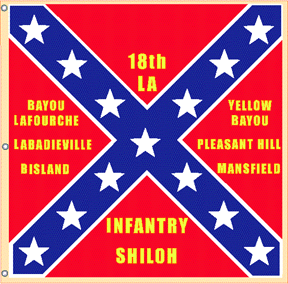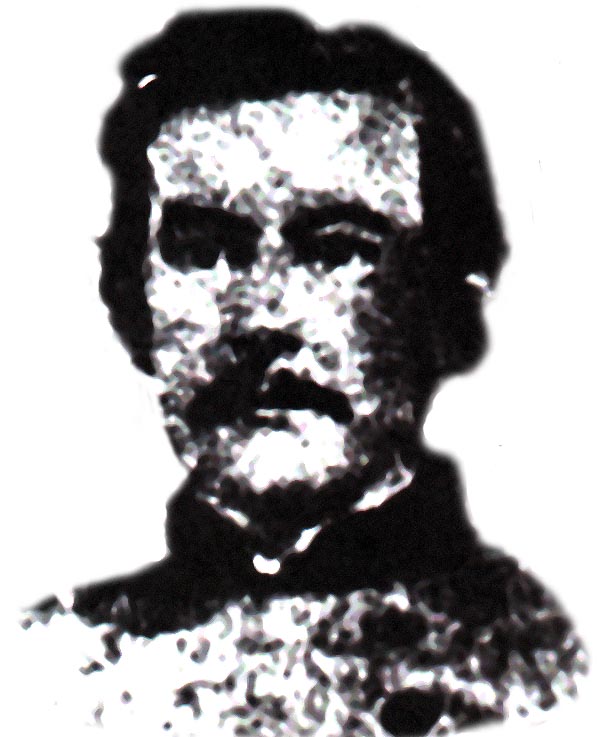
 Battle Flag
Battle Flag
of the
18th Regiment Louisiana Infantry
...Flag design is based on a small torn
section of the regimental battle flag which is on display in
the Confederate Museum, New Orleans, Louisiana. May 19,
1865. When the 18th
Regiment was disbanded the flag was torn into ten pieces and
a piece given to each of
the ten company commanders. (Placement of Battle
Inscriptions is specualtive and based on similar Confederate
battle flags of the same period.)
 Joseph Collins,
Joseph Collins,
Capt., Lt. Col., F. & S.
(We apologize for the quality of
this image; but, the image is the best that we could locate
of the late Joseph Collins. Anyone who would care to share a
better quality image of Col. Collins can contact this
webmaster who would be happy to replace the image and share
it with everyone on the world wide web - jr.)
~*~
Joseph Collins
Capt., Lt. Col., F. &
S.
~*~
~ Military Record
~
Collins, Joseph, Capt. Lt. Col.
Co. I. 18th La. Infty. En. June 19th, 1861, New Orleans. La.
Present on all Rolls to Feb., 1862. Roll for May and June,
1862, Absent. Sick. Re-elected Capt., May 11th, 1862. Roll
for July and Aug., 1862. Wounded at Shiloh. Sick
since April 11th, 1862. Promoted Lt. Col., July 23rd, 1862.
Roll for May and June, 1863, Present. Roll for July and
Aug., 1864, Absent. Detailed on Gen. Court Martial at
Vermilionville, since Aug. 1st, 1863. Also on Rolls of F.
and S. Cons. 18th Regt. and Yellow Jacket Battn. La. Infty.
as Lt. Col. Roll for Jan. and Feb., 1864, Present. On Roll
of Prisoners of War of Official Officers, Paroled
Natchitoches, La., June 8th, 1865, as Col. 18th La. Infty.
(April 6th, 1862, Shiloh...”The result of the charge
made upon the enemy by the 18th Regiment was
disastrous, especially to our company. The loss of
officers and men killed, wounded, and captured
was about 200...Collins of New Orleans...were
wounded;...”, Additional information
transcribed from pg. 45, Reminiscences of Uncle
Silas, by Silas T. Grisamore.)
~
Biography ~
The following is a biography by Silas T.
Grisamore, who
served with Joseph Collins and adds a measure of the
"personal touch"
to the life and times of one of Louisiana's "Leaders in
Gray".
JOSEPH COLLINS
When the 18th Regiment was removed
from Camp Roman to Camp Benjamin below New Orleans, then
composed of eight companies we were joined by a new company
which had been for several months organized and kept on duty
guarding public property in that city, commanded by Capt.
Joseph Collins, who then became our senior captain. The
captain was soon found to be a genial, social companion, a
good officer, and was not long in making himself a favorite
among the officers of the regiment.
He commanded his company in the battle of Pittsburg
landing, and during the arduous duties of the regiment
previous to the battle of Shiloh, he was ever ready to
accomplish any orders that were given or perform any duties
that were required for him to consumate.
In the battle of Shiloh and during our charge upon the
enemy on the evening of the first day, the captain was
wounded and compelled to leave the field. He subsequently
procured a leave of absence and returned to New Orleans,
where he remained but a few days, being obliged to leave
when the city fell into the hands of the enemy. He remained
during the summer on the line of the Jackson Railroad until
sufficiently recovered to resume active duty, when he
rejoined the command at Pollard, Alabama. Upon the promotion
of Major Armant to be colonel. Capt. Collins by seniority
became Lieutenant colonel, but as the governnment at
Richmond ignored this proceeding, at an election held at
Pollard, he was elected lieut. col. over Capt. Wm. Mouton by
a small majority. The Lieut. col. made an efficient field
officer, was a good disciplinarian, and took an active
interest in the welfare of the men under his command, and by
his pleasant and sociable habits, he rendered himself
popular with the soldiers. At the battle at Winn's road
above Labadieville, Col. Armant being in command of all the
forces, the command of the regiment devolved upon Col.
Collins, and during the engagement, the scabbard of his
sword was struck and considerably bent by a ball, which, had
it not met with this obstruction, would in all probability
have put an end to his military career. Col. Collins served
for a long time on a court martial sitting in Alexandria,
but afterwards rejoined his command, and at the battle of
Mansfield was left behind with one half the regiment as a
reserve, being ordered forward just as the enemy gave way.
Col. Armant having fallen, he assumed command of the
regiment and was with it the next day at Pleasant Hill,
althought not warmly engaged.
During our march in pursuit of the enemy, as we were in
the neighborhood of Cheneyville the col. discovered a half
dozen men of his regiment who had attached themselves to
some cavalry and had them arrested.
For this, he was placed under arrest during which time
the fight at Yellow Bayou took place, Capt. Sanchez
commanding the 18th. The colonel was soon released without
either trial or reprimand. During our march through
Arkansas, Gen. Gray, having been elected a member of the
Confederate Congress, resigned his position in the army,
when Col. Collins, as senior officer in the command, assumed
the position of acting brig. gen. until we reached
Alexandria in January 1865, when Col. Bosworth, being his
senior, rejoined the brigade.
Col. Collins was with his regiment at the surrender of
Natchitoches and accompained his men down the river to his
home in New Orleans.
Since his return, the colonel has been quietly
endeavoring to recover his losses, performing the duties
incumbent on him as a good citizen, and confining himself to
the management of his private business.
He is still in the prime of life, and we hope to meet him
many a time in the future and talk over past scenes and
trials which we have undergone in times in which neither of
us regret having participated.
Information and photograph reprinted from:
Reminscences of Uncle Silas:
A History of the Eighteenth Louisiana Infantry
Regiment.
© Copyright 1981
Edited by Arthur W. Bergeron, Jr.
Published by: LeComite' des Archives de la Louisiane
P. O. Box 44370, Baton Rouge, La. 70804
pp. 200 and 228-230
|


